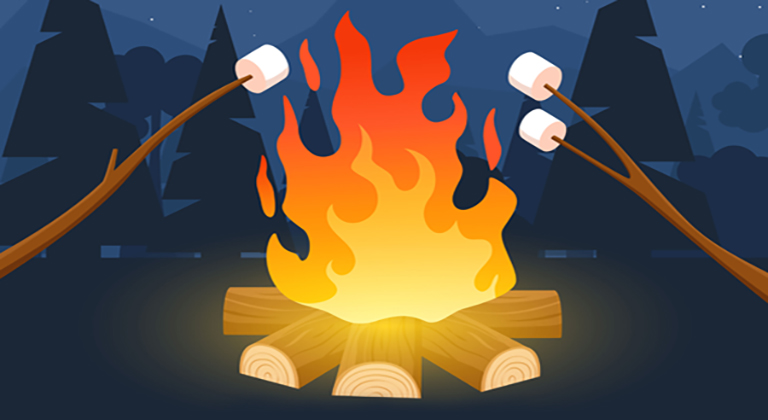For Authors
What makes campfire stories so captivating? Aside from the atmosphere created by crackling flames and darkness held at bay by firelight, these stories grab our attention right away, hold us spellbound, and linger long after the last log burns out. These timeless storytelling techniques have thrilled listeners for generations and continue to shape the novels readers love most.
From gripping openings to unforgettable endings, campfire stories follow a structure that speaks to something deep within us. In this week’s blog, Ginger breaks down those core elements and shows how they can serve as a blueprint for crafting fiction that sticks. Whether you’re revising your first draft or starting something new, this is a reminder of how powerful your storytelling can be when you tap into what has always worked.
The other weekend, my wife and I escaped the stifling grind of suburban life for the rolling beauty of Belvidere, New Jersey, where a friend was celebrating her housewarming near a shimmering lake.
(And, yes, New Jersey does have lots of nature to explore. Don’t let the turnpike fool you, they don’t call this “The Garden State” for nothing!)
There was something magical about the mountains, lakes, and forests that hit me like a reset button. The air was crisp, the trees were ablaze with fresh spring foliage, and the sheer wildness of it all made our townhouse in the cul-de-sacs of Central New Jersey feel like a concrete cage.
As I wandered down to the lake, the crickets chirping all around me, I felt ideas sparking for the first time in ages. Characters whispering, plots unfurling, scenes being laid… it was as if the landscape itself was begging me to tell its story.
That evening, as the sun dipped below the horizon, we all gathered around a firepit in my friend’s backyard. We sat around a crackling fire, breathing in the smell of woodsmoke, and the cold beers I drank tasted better than they ever did back home. A friend from Trinidad had brought jerk chicken and pork to cook on the fire, and she had us all laughing as the flames toasted her delicious dinner.
Then, as the stars started to emerge, the chatter turned to stories—these friends discussing how they met, the situations they faced in the workplace they shared, and gossip about their colleagues and coworkers.
My wife works with them, not me, so I was kind of removed from the stories. I didn’t mind, though. In fact, it was kind of illuminatory. It hit me like a ton of bricks as I listened to them share their stories. This is how humans have always done it.
For 100,000 years, homo sapiens have huddled around fires, sharing stories that make our hearts race and our spines tingle. That night in Belvidere wasn’t just a housewarming, we were repeating a ritual as old as humanity itself.
It got me thinking about the art of storytelling and how those campfire moments hold the key to crafting novels that stick with readers. The stories that kept us glued to our folding chairs by the firepit—beer in hand, eyes wide—aren’t so different from the novels we write and self-publish today.
A hundred centuries might separate us from our ancestors, but the essentials of a compelling story haven’t changed one bit. Whether you’re spinning a yarn under the stars or typing away in a coffee shop, the same elements make a story unforgettable.
So this week, I thought I’d break down the core ingredients of compelling campfire stories and see how they translate into the novels we’re pouring our hearts into writing everyday.
Five Essential Elements of Compelling Campfire Stories (and How They Build a Novel)
1. A Hook That Grabs You by the Throat
Around the campfire, nobody starts with a weather report. The best stories kick off with a line that yanks you in: “It was midnight when the howling started,” or “My grandpa swore he buried that box in the woods.” You’ve got seconds to hook your audience before they reach for another beer or start roasting marshmallows. That opening sets the tone and promises something worth hearing.
In a Novel: Your first sentence, or at least your first page, needs that same gut-punch. Self-published authors, listen up: readers on Amazon are ruthless. They’ll swipe past your book if it doesn’t grab them fast. Think of The Hunger Games: “When I wake up, the other side of the bed is cold.” It’s simple, but it screams trouble. Craft an opening that raises questions or drops readers into the action. Skip the long-winded setup—your novel’s campfire is burning, and you’ve got to keep eyes on you.
2. Relatable Characters You Root For (or Against)
By the fire, the best stories feature people we can picture, or sometimes actually know! That means they’re what people should be. That is, flawed, human, and stuck in a mess. Maybe it’s the cousin who ignored the “No Trespassing” sign or the stranger who wandered into a cursed cabin. We care because they feel real, and their choices make us lean in, whether we’re cheering or shouting, “Don’t go in there!”
In a Novel: Your characters are the heartbeat of your book. Readers need to connect with them, whether they’re a scrappy underdog like Harry Potter or a morally gray antihero like Breaking Bad’s Walter White. As a self-published author, you’re competing with thousands of other titles, so make your characters unforgettable. Give them quirks, fears, and dreams that mirror your readers’ own. A romance novel’s heroine might be a hot mess like Bridget Jones, but her heart’s in the right place, and that’s why we root for her.
3. Stakes That Feel Life-or-Death
Campfire stories thrive on high stakes. The monster’s closing in, the ghost wants revenge, or the treasure’s cursed. Even if it’s just a tale about sneaking into a haunted house, the tale-teller makes it feel like the world’s on the line. That tension keeps us glued to the story, barely blinking despite the smoke watering our eyes.
In a Novel: Your novel needs stakes that make readers care. It doesn’t have to be literal life-or-death, emotional or personal stakes can hit just as hard. In a thriller, it might be stopping a killer; in a romance, it’s risking heartbreak for love. Self-published authors often underestimate this, but stakes are what turn a good idea into a page-turner. Look at The Martian: Mark Watney being stuck on Mars is about as life-and-death as it gets, and that’s why every chapter of this originally self-published novel feels like a fight to survive. Raise the stakes early and keep them climbing and people will be hooked.
4. Vivid, Sensory Details
A campfire story comes alive when you can feel it: the creak of a floorboard, the chill of a foggy night, the stench of something rotten in the woods. Those details pull you into the world, making the story more than words. It’s why we still shiver when someone mentions “the thing in the lake.”
In a Novel: Your prose needs to paint a picture. Authors shouldn’t skimp on sensory details. they’re what make your world tangible. Think of The Lord of the Rings: Tolkien’s descriptions of Middle-earth make you smell the grass and hear the ring’s whisper. Whether you’re writing sci-fi or cozy mystery, it’s your job as an author to ground your readers in the setting with sights, sounds, and smells. But don’t overdo it. Sprinkle details like seasoning, not a salt lick.
5. A Twist or Payoff That Sticks
The best campfire stories end with a bang—a twist we didn’t see coming or a resolution that feels earned. Maybe the ghost was the narrator all along, or the treasure hunter escaped but lost something irreplaceable. That final moment lingers, sparking whispers long after the fire’s gone out.
In a Novel: Your ending needs to deliver a similarly climactic conclusion. Readers invest hours in your book, so don’t fizzle out with a predictable or rushed ending. A great twist, like in Gone Girl, or a satisfying arc, like in Pride and Prejudice, leaves readers buzzing. As a self-published author, your novel’s ending is your last chance to hook fans for your next book. Plan it early and make it unforgettable, whether it’s a shock or a quiet, perfect note.
Why These Elements Matter for Self-Published Authors
That night in Belvidere, as my wife’s friends swapped stories by the firepit, I realized something profound. The tales we remember most fondly are the ones that hit elemental notes.
They’re the stories that made us laugh, gasp, or stare into the flames, wondering what’s lurking in the dark. Those moments stick with us because they tap into something primal, something that’s been true ever since our ancestors first spun tales beneath the starry skies.
As an author, you’re not just writing books. You’re carrying on that same ancient tradition. Your novel is your campfire, and your readers are gathered around it, waiting for a story that’ll keep them up all night.
The elements that made a good campfire story unforgettable—hooks, characters, stakes, details, and payoffs—are the same ones that’ll make your book stand out in a crowded Amazon marketplace.
Remember, you’re not competing with just other authors. As a storyteller, you’re also up against Netflix, TikTok, and a million other narrative distractions. But if you can build a story that feels like it could be told around a campfire? That’s crafting something immortal.
So, next time you’re plotting your novel, picture yourself by that firepit, beer in hand, with your friends leaning in to listen to your story.
What’s the hook that’ll make them stop mid-sip? Who’s the character they’ll root for? What’s at stake, and how will you paint the world so vividly they forget the real one? And when the story ends, how will you leave them wanting more?
If you can channel the essentials of a good campfire story into your novel, it won’t just be read, it’ll be remembered, just like the tales my wife’s friends told beneath the stars of rural New Jersey that night in Belvadire.
Are you the kind of person who tells stories around the campfire? If so, what’s your favorite storytelling trick to hook your listeners? Drop it in the comments, and let’s keep the campfires of creativity burning!
Share this blog
About the Author

Ginger is also known as Roland Hulme - a digital Don Draper with a Hemingway complex. Under a penname, he's sold 65,000+ copies of his romance novels, and reached more than 320,000 readers through Kindle Unlimited - using his background in marketing, advertising, and social media to reach an ever-expanding audience.



















 English (US) ·
English (US) ·